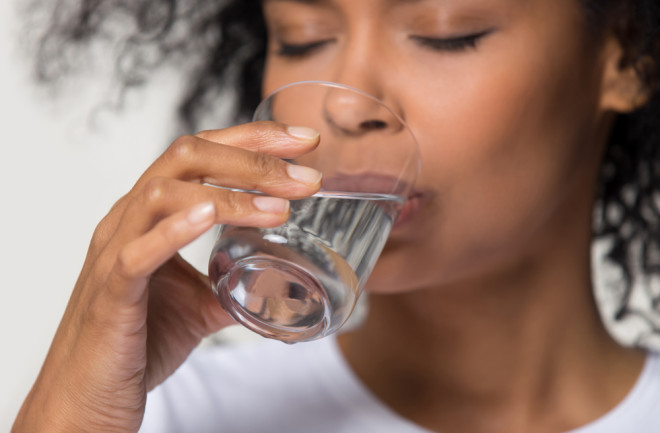There’s no doubt that water plays a critical role in how well our bodies function.
Which is hardly surprising when you consider that 60 percent of the human body is made up the clear liquid — lungs are 83 percent water, skin 64 percent and even bones 31 percent. Sloshing through our internal systems, water lubricates joints, protects internal organs, regulates body temperature and helps deliver oxygen all over the body.
But can it also help you to shed weight?
In short, yes. There is reliable science to suggest that keeping yourself well hydrated can play a role in helping you to shed a few unwanted pounds.
The first reason is perhaps the simplest, that loading up on the calorie-free liquid can stop you reaching for the more calorie-laden alternatives. This works in two ways. First, explains Tamara Willner, a nutritionist at healthy eating plan Second Nature, “often our body can mistake feelings of thirst for hunger.” Which means by reaching for a glass of water first when hunger pangs start, those feelings of hunger may naturally subside. In fact, one small study of 15 adolescents in the Journal of Clinical Nutrition Research in 2018 found that when participants drank water prior to a test meal, they consumed significantly less of the food.
There’s another reason that water can help reduce cravings though, explains Willner. “If we’re drinking water rather than sugary or artificially sweetened beverages, then we’re less likely to increase our sugar cravings, which has an indirect effect on our appetite and weight,” she adds. “If we crave more sweet foods, we’re more likely to eat them, and therefore more likely to gain weight in the long-term.”
Reduce Calories
A 2016 study found that even small changes can lead to significant benefits. Among U.S. adults who consume one serving of sugar-sweetened beverages per day, replacing that drink with water reduced overall calories coming from drinks from 17 to 11 percent. The swap reduced daily calories from drinks from 17 percent to 11 percent.
As well as helping us to consume less calories, there is also good reason to think that hydration could indirectly help us to burn more. That’s because even mild dehydration (around 1 percent lower than optimal levels) can create a sense of fatigue, low mood and loss of focus — none of which are conducive to the energy and motivation required to carry out the physical activities needed to burn calories.
A Metabolism Connection?
And some studies have suggested that this link between water intake and how efficiently we burn calories could be even more integral. For example, one 2016 review published in the journal Frontiers of Nutrition, suggested a link between levels of hydration and increased rates of lipolysis, the process by which fats are broken down in the body.
It’s important to note though that researchers don’t fully understand why — or if — this might be the case. The researcher behind the 2016 review suggested it could be down to water swelling the volume of cells and thereby increasing sensitivity to insulin, which can lead to nutrients being diverted to your muscles, rather than stored as fat cells. Or it could be because water increased the pace of mitochondrial function, and thereby sped up metabolism. But the researcher pointed out that further investigation is needed, especially considering that the majority of studies cited in the review involved rats, not humans.
The same goes for a 2003 study published in the Journal of Clinical Endocrinology and Metabolism. Researchers took 14 men and women, all of a healthy weight, and studied the link between drinking 16.7 ounces (500 milliliters of water), and how quickly the subjects expended energy, (i.e. how quickly their metabolism worked). They found that metabolic rates increased by 30 percent, an increase that began as soon as 10 minutes after consuming water.
Willner suggests taking the findings of such studies with a big pinch of salt, however. “There’s little to no high-quality scientific evidence suggesting that water or staying hydrated has any impact on our metabolism,” she says, with this study using only a very small number of test subjects.
Plus, its findings have been contradicted by later research. “A later review of more of the evidence concluded that only three out of 11 studies supported this theory [that water sped up metabolism],” says Willner. “Of those three studies, the sample sizes were very small (only around 20 people or less) and the reported increase in energy used up wasn’t a significant amount.
“As it stands, there aren’t any clear physiological mechanisms whereby water we drink would have a direct effect on how much energy our body uses and hence our metabolism.”
How Much Water Should You Drink?
Regardless though, there’s still enough of an existing connection between hydration and calorie intake — as well as overall health — that drinking plenty of water should be part of any healthy and moderate weight loss plan. There’s no definitive answer for exactly how much water we should aim for — some experts argue that simply using thirst as an indicator for how much we need is as good a mechanism as any. But if you prefer a firm number to work toward, aim for about 11.5 cups (2.7 liters) for women, and 15.5 cups (3.7 liters) for men, as per the recommendations of the National Academies of Sciences, Engineering, and Medicine.
After all, even if all that water doesn’t immediately trim your waistline, at least you know you’ll be boosting all sorts of other bodily functions that keep you fit and healthy in the long run.

